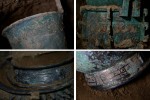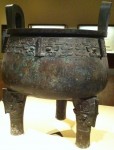 Archaeologists excavating a tomb complex from the Western Zhou Dynasty (1046–771 B.C.) in Baoji, Shaanxi province, northwest China, have unearthed 44 pieces of bronzeware and two pieces of pottery, a trove of national importance. The tomb was discovered in June of this year by villagers working the land. They alerted the authorities and state archaeologists have been excavating the site since August.
Archaeologists excavating a tomb complex from the Western Zhou Dynasty (1046–771 B.C.) in Baoji, Shaanxi province, northwest China, have unearthed 44 pieces of bronzeware and two pieces of pottery, a trove of national importance. The tomb was discovered in June of this year by villagers working the land. They alerted the authorities and state archaeologists have been excavating the site since August.
 The bronzeware is divided among eight niches. The quantity of the bronze vessels and the system of niches they inhabit make it a very rare discovery that gives archaeologists a unique chance to study the burial practices of the early Western Zhou period. The pieces would have had a variety of uses — cooking, food storage, holding water or alcoholic beverages — The sheer numbers of bronzeware and their elaborate, delicate decoration point to this being the tomb of a nobleman, someone of great wealth and social standing in the area.
The bronzeware is divided among eight niches. The quantity of the bronze vessels and the system of niches they inhabit make it a very rare discovery that gives archaeologists a unique chance to study the burial practices of the early Western Zhou period. The pieces would have had a variety of uses — cooking, food storage, holding water or alcoholic beverages — The sheer numbers of bronzeware and their elaborate, delicate decoration point to this being the tomb of a nobleman, someone of great wealth and social standing in the area.
Lead archaeologist Wang Zhankui hopes the inscriptions on the bronze vessels once translation may identify who was buried in the tomb.
 Last year, a Western Zhou-era tomb discovered in Baoji was found to contain a rich collection of bronze vessels as well, albeit less than half the number discovered here. One of the containers was still sealed. When archaeologists shook it, they could hear liquid sloshing inside which led to a speculative frenzy declaring it the oldest wine ever found in China. That was a hasty reaction, but the presence of what is probably some sort of alcoholic beverage in the vessel was of particular historical note given its burial with another bronze piece: a square piece three feet long called a “Jin” which was inscribed with admonitions against the excessive consumption of alcohol.
Last year, a Western Zhou-era tomb discovered in Baoji was found to contain a rich collection of bronze vessels as well, albeit less than half the number discovered here. One of the containers was still sealed. When archaeologists shook it, they could hear liquid sloshing inside which led to a speculative frenzy declaring it the oldest wine ever found in China. That was a hasty reaction, but the presence of what is probably some sort of alcoholic beverage in the vessel was of particular historical note given its burial with another bronze piece: a square piece three feet long called a “Jin” which was inscribed with admonitions against the excessive consumption of alcohol.
This is a recurring theme in early Western Zhou bronzes. A ding (a bronze cauldron on feet now in the National Museum of China) made during the reign of King Kang (1020 – 996 B.C.) bears an inscription to his minister Yu attributing the fall of the Shang Dynasty to alcohol and the rise of the Western Zhou to its prohibition.
 In the Shangshu or Book of Documents, a collection of historical speeches and sayings by rulers from four dynasties up to the Western Zhou, includes an Announcement about Drunkenness, purportedly made by King Wen of Zhou, the titular founder of the Western Zhou dynasty although in fact it was his son who carried out his father’s plans and finally overthrew the decadent Shang Dynasty. King Wen directly blames the Shang king’s alcoholism for the fall of his dynasty:
In the Shangshu or Book of Documents, a collection of historical speeches and sayings by rulers from four dynasties up to the Western Zhou, includes an Announcement about Drunkenness, purportedly made by King Wen of Zhou, the titular founder of the Western Zhou dynasty although in fact it was his son who carried out his father’s plans and finally overthrew the decadent Shang Dynasty. King Wen directly blames the Shang king’s alcoholism for the fall of his dynasty:
“I have heard it said likewise, that the last successor of those kings was addicted to drink, so that no charges came from him brightly before the people, and he was (as if) reverently and unchangingly bent on doing and cherishing what provoked resentment. Greatly abandoned to extraordinary lewdness and dissipation, for pleasure’s sake he sacrificed all his majesty. The people were all sorely grieved and wounded in heart; but he gave himself wildly up to drink, not thinking of restraining himself. but continuing his excess, till his mind was frenzied, and he had no fear of death His crimes (accumulated) in the capital of Shang: and though the extinction of the dynasty (was imminent), this gave him no concern, and he wrought not that any sacrifices of fragrant virtue might ascend to Heaven. The rank odour of the people’s resentments, and the drunkenness of his herd of creatures, went loudly up on high, so that Heaven sent down ruin on Yin, and showed no love for it – because of such excesses. There is not any cruel oppression of Heaven; people themselves accelerate their guilt, (and its punishment)).”
He is very keen, therefore, to ensure his own people do not fall victim to the dangers of spirits.
King Wen admonished and instructed the young nobles, who were charged with office or in any employment, that they should not ordinarily use spirits; and throughout all the states, he required that such should drink spirits only on occasion of sacrifices, and that then virtue should preside so that there might be no drunkenness.
And should admonishment not suffice, then sterner measures are in order.
“If you are informed that there are companies that drink together, do not fail to apprehend them all, and send them here to Zhou, where I may put them to death. As to the ministers and officers of Yin who were led to it and became addicted to drink, it is not necessary to put them to death (at once); let them be taught for a time. If they follow these (lessons of mine), I will give them bright distinction. If they disregard my lessons, then I, the One man, will show them no pity. As they cannot change their way, they shall be classed with those who are to be put to death.”